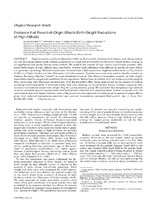Evidence that parent-of-origin affects birth-weight reductions at high altitude
Fecha
2008-02-19Autor
Bennett, Adam
Sain, Stephen R
Vargas, Enrique
Moore, Lorna G
Metadatos
Mostrar el registro completo del ítemResumen
Abstract.
Hypoxia exerts a profound depressant effect on fetal growth, lowering birth weight, and raising mortality risk. Multigenerational high-altitude populations are relatively protected from this birth-weight decline, leading us
to hypothesize that genetic factors were involved. We asked if the amount of high- versus low-altitude ancestry influenced birth weight at high altitude and, specifically, whether such influences were affected by parent-of-origin effects
(i.e., genomic imprinting). Medical records were reviewed from 1,343 consecutive, singleton deliveries in La Paz, Bolivia
(3,600 m) of high- (Andean) or low- (European) altitude ancestry. Parental surnames were used to classify ancestry as
Andean, European, Mestizo (‘‘mixed’’) or some combination thereof. The effects of population ancestry on birth weight
were determined by categorical, conditional linear regression. Babies born at altitude with two Andean parents weighed
252 g more than their European counterparts, with the protective effect being proportional to the amount of Andean
parentage and independent of maternal parity, body size, smoking, or socioeconomic status. Paternal compared with
maternal transmission raised birth weight 81 g for a given ancestry group. We concluded that indigenous high-altitude
ancestry protected against hypoxia-associated fetal growth reduction in a dose-dependent fashion consistent with the
involvement of genetic factors. Further, some of the genes involved appeared to be influenced by parent-of-origin effects,
given that maternal transmission restricted and paternal transmission enhanced fetal growth.

